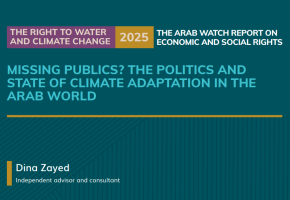
The Politics of International Assistance: Shifting Sands and Shrinking Spaces

The Politics of
International Assistance: Shifting Sands and Shrinking Spaces -
The 2023 Gaza war sent shockwaves through the international community, casting a long shadow over the already complex landscape of international assistance. This conflict, evolving foreign aid policies, and heightened political tensions have triggered a significant transformation with profound implications for civil society organizations (CSOs) worldwide, particularly in the Arab region. This article delves into these changes, exploring their impact on the sustainability, operations, and effectiveness of CSOs and examining the broader consequences for civil society, human rights, and development projects.
Changes in Foreign Aid Policy
In recent years, the
global landscape of foreign aid has been evolving. Organizations working in
democracy promotion, education, service provision, and long-term development
have witnessed budget cuts. For example, during the 2024 fiscal year, USAID
humanitarian support increased by $800 million at the expense of development
support, especially in the field of water, sanitation, and hygiene.
Beyond the US, the
global landscape of foreign aid is also transforming. The UN climate summit in
Baku demonstrated the difficulty in reaching agreements on climate financing
initiatives. Adding to this complexity, UN-backed appeals for 2024 are
projected to decrease compared to previous years, focusing on core life-saving
activities. This shift towards prioritizing emergency response may further
strain resources available for long-term development and human rights work
undertaken by CSOs.
Furthermore,
questioning the effectiveness of foreign aid programs is becoming an
increasingly appealing issue raised by policymakers in donor countries. A lack
of proper impact assessments for these programs and concerns about the
sustainability of aid initiatives often hampers this scrutiny. These trends
suggest a shift in foreign aid policies towards a more reactive approach,
prioritizing immediate needs and potentially compromising transparency and
long-term development goals. This shift has significant implications for CSOs,
particularly those engaged in human rights and development work.
Why is Funding
Shrinking?
Several factors contribute to the potential shrinking of funding for human rights organizations:
- Budget
Constraints: Economic
challenges in Europe and the US may lead to reduced overall aid budgets,
impacting funding for human rights organizations.
- Shifting
Priorities: Governments
may prioritize other areas, such as security, migration, or climate
change, over human rights and democracy promotion.
- Rising Populism: The rise
of populist movements and nationalist sentiments in some countries may
lead to reduced support for international cooperation and human rights.
- Proliferation of
Conflicts: The
increasing number of conflicts and humanitarian crises worldwide may
strain resources and divert funding away from long-term development and
human rights work.
- Shrinking Space
for Civil Society: In some countries, governments are
increasingly restricting the activities of CSOs, making it more difficult
for them to operate and access funding.
Shrinking funding for
human rights organizations is a complex issue with multiple contributing
factors, and the chances to reverse this trend appear bleak. Addressing this
challenge requires a multifaceted approach, including advocacy for increased
aid budgets, promoting the value of human rights, and supporting the resilience
of civil society.
Impact of the Gaza
War and H.R. 9495 on Human Rights Organizations in the Arab Region
The 2023 Gaza war had
a devastating impact on the region and its people. Beyond the immediate
humanitarian crisis, the conflict profoundly affected human rights and
democracy organizations in the Arab region. The war resulted in the death,
injury, and displacement of numerous NGO staff members in Gaza, severely
hindering their operations.
The war also brought
increased scrutiny and pressure on human rights organizations, with some facing
accusations of bias or even being labeled as supportive of terrorism. This
hostile environment has created significant obstacles for these organizations,
including reduced donor support, loss of staff, and a climate of fear that
undermines their crucial work. In the aftermath of the war, human rights
organizations have taken a strong stance, condemning human rights violations
and advocating for accountability.
Adding to these
emerging complexities was the approval by the US House of Representatives of
H.R. 9495, the "Stop Terror-Financing and Tax Penalties on American
Hostages Act." This act grants the US Secretary of the Treasury the
authority to designate a US nonprofit as a "terrorist supporting
organization" and to strip it of its tax-exempt status if the Secretary
finds that the nonprofit has provided material support to a terrorist group.
Numerous human rights
organizations have expressed serious concerns about the potential impact of
H.R. 9495 on their work. These concerns primarily stem from the bill's broad
and vague language, which grants the Secretary of the Treasury significant discretion,
and the lack of due process and transparency in the bill's procedures. The bill
does not require the Secretary of the Treasury to share the full evidence or
reasoning behind the designation with the accused nonprofit. This lack of
transparency raises concerns about the potential for abuse and politically
motivated targeting of organizations critical of the government or advocating
for unpopular causes. The proposed framework offers no clear mechanism for
organizations to challenge these accusations, leaving them vulnerable to
potentially unjust and unfounded designations.
The potential impact
of H.R. 9495 is particularly concerning for human rights organizations working
in the Arab region. The bill's vague language and lack of due process could
exacerbate existing challenges and further restrict the space for human rights
work in the region. Human rights organizations in the Arab region are often the
target of accusations when they criticize government policies or document human
rights abuses. H.R. 9495 could provide a new tool for governments to target
these organizations and silence their critical voices
The loss of
tax-exempt status could severely impact the funding and operations of human
rights organizations in the Arab region. Many of these organizations rely on
international donors, and this bill might deter private donors from providing
support. Consequently, human rights organizations might face financial
instability, hindering their ability to carry out their essential work.
H.R. 9495 could also
create obstacles to international cooperation on human rights issues. The
bill's provisions could make it more difficult for US-based human rights
organizations to partner with organizations in the Arab region. This could
hinder information sharing, advocacy efforts, and the provision of assistance
to vulnerable populations.
Conclusion
The evolving
political landscape of international assistance presents significant challenges
and opportunities for CSOs, particularly those focused on human rights and
democracy in the Arab region. The 2023 Gaza war, the passing of H.R. 9495,
shifting foreign aid policies, and various other factors have created a more
complex and challenging environment for these organizations.
Despite these challenges, CSOs can leverage their expertise and networks to adapt and innovate. By embracing collaboration, advocating for supportive policies, and raising awareness about the critical role of civil society, CSOs can continue to make a vital contribution to human rights, development, and peacebuilding efforts worldwide. The future of international assistance hinges on the ability of CSOs to navigate this changing landscape and effectively advocate for a more just and equitable world.
Recent publications

